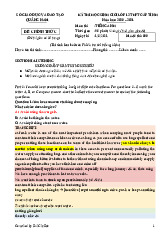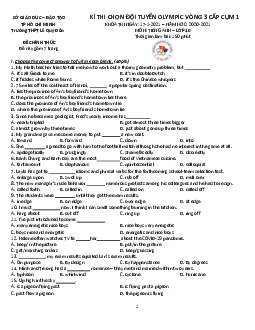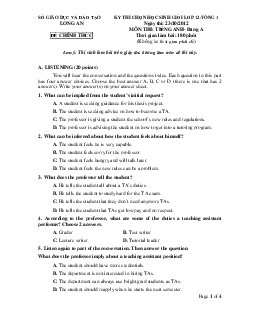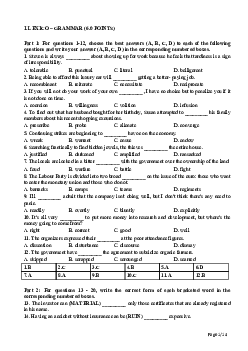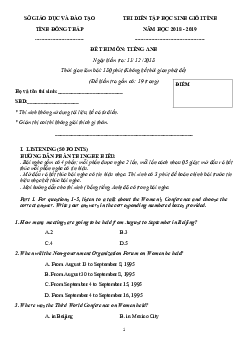








Preview text:
SỞ GIÁO DỤC VÀ ĐÀO TẠO LÀO CAI
KỲ THI CHỌN ĐỘI DỰ TUYỂN HỌC SINH GIỎI QUỐC GIA
ĐỀ THI CHÍNH THỨC NĂM 2019 (Vòng 1) Môn thi: TIẾNG ANH
Thời gian thi: 180 phút (không kể thời gian giao đề) Số phách Ngày thi: 04/10/2018 Đề thi có 15 trang
Thí sinh không được sử dụng tài liệu, kể cả từ điển.
Giám thị không giải thích gì thêm. LEXICO – GRAMMAR
Choose the correct answer A, B, C, or D to each of the following questions. Write your answers
in the corresponding numbered boxes provided.
1. Fame made her lead a rather __________life, in her own private world. A. faint B. secluded C. distant D. far-away
2. When the cost was __________ the advantages, the scheme looked good. A. set against B. weighed up C. made up for D. settled up with
3. The little boy has rather __________ parents, who give him everything he asks for. A. advantageous B. privileged C. gainful D. indulgent
4. When the company advertised the position, they were __________with applications. A. dense B. fil ed C. inundated D. plentiful
5. I don’t believe there’s a ______ of evidence that could be held against him. A. shred B. grain C. drop D. strain
6. She was so ill that it was ________ whether she would live or not. A. win or lose B. come and go C. touch and go D. on and off
7. The renewed interest in Elizabethan times is evident in the _____ of new Hollywood films set during that period. A. spate B. hypocrisy C. transience D. demise
8. To his own great ________, professor Stephen has discovered a new method of diabetes treatment. A. reputation B. name C. fame D. credit
9. The princess's nanny's autobiography really gives the _______ on life among the royals. A. know-how B. low-down C. look-out D. show-down
10. Serena is still _______ ignorant of the fact that she is about to be made redundant. A. delightedly B. blissfully C. jubilantly D. ecstatically READING (50 POINTS)
Read the article about 'Psychic Paul’, an octopus who predicted football results. Decide which
answer (A, B, C or D) best fits each gap. Write your answers in the corresponding numbered boxes provided.
The octopus who predicted a World Cup final
Our interest in animals' intelligence and possible psychic powers spans the centuries. For some
people, Paul the Octopus proved conclusively, beyond all 46._________, that animals have intelligence.
Spain’s victory over Germany in the 2010 World Cup came as no 47._________ to many football fans,
because the result had already been 48._________ by Paul. This was a creature that had achieved celebrity
status with its incredibly 49._________ predictions.
Known as the ‘psychic octopus’, Paul seemed to demonstrate above-average intelligence. It seemed
he could predict all of Germany’s World Cup results every time he was asked. Such was the popularity of his 1 | P a g e
selections that, just before the final, a German news channel broadcast Paul’s prediction live on TV. Paul’s
handlers, at an aquarium in the city of Oberhausen, turned him into an international superstar, A simple
50._________ was followed each time. Mussels were placed into two glass boxes. One box carried
Germany’s flag while the other had the flag of the opposing team. Paul then made his ‘prediction’ by
swimming towards one of the boxes and eating the tasty mussel inside.
Aquarium staff never claimed that this was a carefully controlled scientific 51._________. There did
indeed seem to be a lack of concrete 52._________ that Paul was making intelligent choices.
The day before the World Cup final, Paul at first swam towards the Spanish flag, before moving and
hovering over the German box. After a few moments, the octopus eventually returned to his first choice.
Occurrences like this 53._________, some doubt over whether Paul really did have ‘psychic’ powers.
Not everyone appreciated Paul. When Argentina lost to Germany in the quarter-final, Argentine fans
threatened to put him in a paella. The newspaper El Dia even printed a recipe for anyone who captured
Paul: All you need are some potatoes, olive oil and a little salt.’
The octopus sometimes erred in his predictions, although not often. His most famous mistake was
when he wrongly picked Germany over Spain in the 2008 European Championship. Spain won 1-0. Proof,
perhaps, that he was capable of 54._________ from his mistakes. Paul lived a happy and celebrated life
and died naturally in 2010. The world awaits the next animal oracle. 46. A question B doubt C shadow D disbelief 47. A surprise B shock C miracle D amazement 48. A forecast B foretold C envisaged D projected 49. A correct B detailed C strict D accurate 50. A action B procedure C performance D program 51. A examination B check C experiment D analysis 52. A evidence B figures C grounds D information 53. A made B gave C had D cast 54. A studying B learning C knowing D discovering
Read the following passage, then decide which word best fits each gap. Write your answers
in the numbered boxes provided. College news
Professor Tim Scholes has been nominated 55._____________ a national award, the Taymon
Environmental Prize, in recognition of his research into the impact 56._____________ deforestation
57._____________ land in the Amazon basin. He is interested in both its potential benefits for agriculture
and the risk of desertification, a process by 58._____________ formerly fertile land becomes desert.
Scholes’s most recent study was undertaken 59._____________ part of an international project led by Professor Clara Berminton.
According to Scholes, a lucrative prize 60._____________the Taymon would make a significant contribution
to funding for the next stage of his research. The awards ceremony will 61._____________ place in London
on 19 March. Scholes jokes that he 62._____________ well be the first person in the Taymon’s history to
be nominated six times without winning. 63._____________ this prove to be the case, though, Scholes
won’t be too upset. He believes the publicity generated by the event will raise awareness of the problem of
deforestation, if 64._____________else.
Read the passage and do the tasks that follow.
EXAMINING THE PLACEBO EFFECT By Steve Silberman 2 | P a g e
The fact that taking a fake drug can powerfully improve some people’s health – the so-called placebo effect
– was long considered an embarrassment to the serious practice of pharmacology, but now things have changed.
Several years ago, Merck, a global pharmaceutical company, was falling behind its rivals in sales. To
make matters worse, patterns on five blockbuster drugs were about to expire, which would allow cheaper
generic products to flood the market. In interviews with the press, Edward Scolnick, Merck’s Research
Director, presented his plan to restore the firm to pre-eminence. Key to his strategy was expanding the
company’s search into the anti-depressant market, where Merck had trailed behind, while competitors like
Pfizer and GlaxoSmithKline had created some of the best-selling drugs in the world. “To remain dominant in
the future,” he told one media company, “we need to dominate the central nervous system.”
His plan hinged on the success of an experimental anti-depressant codenamed MK-869. Still in
clinical trials, it was a new kind of medication that exploited brain chemistry in innovative ways to promote
feelings of well-being. The drug tested extremely well early on, with minimal side effects. Behind the
scenes, however, MK-869 was starting to unravel. True, many test subjects treated with the medication felt
their hopelessness and anxiety lift. But so did nearly the same number who took a placebo, a look-alike pill
made of milk sugar or another inert substance given to groups of volunteers in subsequent clinical trials to
gauge the effectiveness of the real drug by comparison. Ultimately, Merck’s venture into the anti-depressant
market failed. In the jargon of the industry, the trials crossed the “futility boundary”.
MK-869 has not been the only much-awaited medical breakthrough to be undone in recent years by
the placebo effect. And it’s not only trials of new drugs that are crossing the futility boundary. Some
products that have been on the market for decades are faltering in more recent follow-up tests. It’s not that
the old medications are getting weaker, drug developers say. It’s as if the placebo effect is somehow
getting stronger. The fact that an increasing number of medications are unable to beat sugar pills has
thrown the industry into crisis. The stakes could hardly be higher. To win FDA* approval, a new medication
must beat placebo in at least two authenticated trials. In today’s economy, the fate of a well-established
company can hang on the outcome of a handful of tests.
Why are fake pills suddenly overwhelming promising new drugs and established medicines alike?
The reasons are only just beginning to be understood. A network of independent researchers is doggedly
uncovering the inner workings and potential applications of the placebo effect.
A psychiatrist, William Potter, who knew that some patients really do seem to get healthier for
reasons that have more to do with a doctor’s empathy than with the contents of a pill, was baffled by the
fact that drugs he had been prescribing for years seemed to be struggling to prove their effectiveness.
Thinking that a crucial factor may have been overlooked, Potter combed through his company’s database of
published and unpublished trials – including those that had been kept secret because of high placebo
response. His team aggregated the findings from decades of anti-depressant trials, looking for patterns and
trying to see what was changing over time. What they found challenged some of the industry’s basic
assumptions about its drug-vetting process.
Assumption number one was that if a trial were managed correctly, a medication would perform as
well or badly in a Phoenix hospital as in a Bangalore clinic. Potter discovered, however, that geographic
location alone could determine the outcome. By the late 1990s, for example, the anti-anxiety drug
Diazepam was still beating placebo in France and Belgium. But when the drug was tested in the U.S., it was
likely to fail. Conversely, a similar drug, Prozac, performed better in America than it did in Western Europe
and South Africa. It was an unsettling prospect: FDA approval could hinge on where the company chose to conduct a trial.
Mistaken assumption number two was that the standard tests used to gauge volunteers’
improvement in trials yielded consistent results. Potter and his colleagues discovered that ratings by trial
observers varied significantly from one testing site to another. it was like finding out that the judges in a
tight race each had a different idea about the placement of the finish line. 3 | P a g e
After some coercion by Potter and others, the National Institute of Health (NIH) focus on the issue
in 2000, hosting a three-day conference in Washington, and this conference launched a new wave of
placebo research in academic laboratories in the U.S. and Italy that would make significant progress toward
solving the mystery of what was happening in clinical trials.
In one study last year, Harvard Medical School researcher Ted Kaptchuk devised a clever strategy
for testing his volunteers’ response to varying levels of therapeutic ritual. The study focused on a common
but painful medical condition that costs more than $40 billion a year worldwide to treat. First, the volunteers
were placed randomly in one of three groups. One group was simply put on a waiting list; researchers know
that some patients get better just because they sign up for a trial. Another group received placebo
treatment from a clinician who declined to engage in small talk. Volunteers in the third group got the same
fake treatment from a clinician who asked them questions about symptoms, outlined the causes of the
illnesses, and displayed optimism about their condition.
Not surprisingly, the health of those in the third group improved most. In fact, just by participating
in the trial, volunteers in this high-interaction group got as much relief as did people taking the two leading
prescription drugs for the condition. And the benefits of their “bogus” treatment persisted for weeks
afterward, contrary to the belief- widespread in the pharmaceutical industry – that the placebo response is short-lived.
Studies like this open the door to hybrid treatment strategies that exploit the placebo effect to make
real drugs safer and more effective. As Potter says, “To really do the best for your patients, you want the
best placebo response pls the best drug response.” (Adapted from Wired Magazine) Questions 72-76
Do the following statements agree with the claims of the writer? Write YES
if the statement agrees with the claims of the writer NO
if the statement contradicts with the claims of the writer 72. Merck’s experience with NOT GIVEN
if it is impossible to say what the writer thinks about this MK-869 was unique. 73. These days, a small
number of unsuccessful test results can ruin a well-established drugs company.
74. Some medical conditions are more easily treated by a placebo than others.
75. It was to be expected that the third group in Kaptchuk’s trial would do better than the other two groups.
76. Kaptchuk’s research highlights the fact that combined drug and placebo treatments should be avoided. Your answers: 72. 73. 74. 75. 76. Questions 77-81
Complete the summary using the list of words, A-I, below.
As a result of concerns about increasing 77. _________________________ in the drugs industry, the
pharmaceutical company Merck decided to increase its 78. _________________________in the anti-
depressant market. The development of the drug MK-869 was seen as the way forward.
Initially, MK-869 had some 79. _________________________, but later trials revealed a different picture.
Although key 80. _________________________ could be treated with the drug, a sugar pill was proving
equally effective. In the end, the 81. _________________________indicated that it was pointless
continuing with the development of the drug. A activity D patients G symptoms B prices E tests H competition C success F diseases I criticism 4 | P a g e Questions 82-85
Choose the correct letter A, B, C or D.
82. Which of the following is true of William Potter’s research?
A. It was based on recently developed drugs that he had recommended.
B. It included trial results from a range of drugs companies.
C. Some of the trial results he investigated had not been made public.
D. Some of his findings were not accepted by the drugs industry.
83. What did William Potter’s research reveal about the location of drugs trials?
A. The placebo effect was weakest in the U.S.
B. The results were not consistent around the world.
C. Results varied depending on the type of hospital.
D. The FDA preferred drugs to be tested in different countries.
84. What does the “tight race” refer to in the passage?
A. the standard tests B. consistent results C. ratings by trial observers D. testing sites
85. What significant discovery was made by Ted Kaptchuk?
A. The effects of a placebo can last longer than previously thought.
B. Patients’ health cam improve while waiting to undergo a trial.
C. Patients respond better to a placebo if they are treated by the same clinician throughout the trial.
D. Those conducting a placebo trial need to know the subjects’ disorder well.
You are going to read an article about electronic books and reading. For questions 8 6 - 9 5 ,
choose from the sections {A - D). The sections may be chosen more than once.
In which section does the writer mention
an example of superseded technology that still has a certain appeal? 86
an analogy used to emphasise how seriously an idea is taken? 87
an anxiety she shares with other like-minded people? 88
a development that questions our assumptions about what reading actually entails? 89
the willingness of writers to experiment with new ideas? 90
the idea that books have always been part of an ongoing interactive process? 91
a seeming contradiction in her own attitudes? 92
a belief that the fundamental nature of reading will change? 93
finding pleasure in another readers' reactions to a book? 94
a view that a prediction is somewhat exaggerated? 95
THE BOOK IS DEAD – LONG LIVE THE BOOK
Electronic books are blurring the line between print and digital A
A lot of ink has been spilled on the supposed demise of the printed word. Ebooks are outselling
paper books. Newspapers are dying. To quote one expert: The days of the codex as the primary
carrier of information are almost over.' This has inspired a lot of hand- wringing from publishers,
librarians, archivists - and me, a writer and lifelong bibliophile who grew up surrounded by paper
books. I've been blogging since high school, I'm addicted to my smartphone and, in theory, I should
be on board with the digital revolution - but when people mourn the loss of paper books, I
sympathise. Are printed books really going the way of the dodo? And what would we lose if they
did? Some commentators think the rumours of the printed word's imminent demise have been rather
overstated. Printed books will live on as art objects and collector's items, they argue, rather in the
way of argue, rather in the way of vinyl records. People may start buying all their beach novels and
periodicals in ebook formats and curating their physical bookshelves more carefully. It is not about
the medium, they say, it is about people. As long as there are those who care about books and don't
know why, there will be books. It's that simple. 5 | P a g e B
Meanwhile artists are blending print with technology. Between Page and Screen by Amaranth Borsuk
and Brad Bouse is a paper book that can be read only on a computer. Instead of words, every page
has a geometric pattern. If you hold a printed page up to a webcam, while visiting the book's related
website, your screen displays the text of the story streaming, spinning and leaping off the page.
Printed books may need to become more multi-faceted, incorporating video, music and interactivity.
A group at the MIT Media Lab already builds electronic pop-up books with glowing LEDs that
brighten and dim as you pull paper tabs, and authors have been pushing the boundaries with
'augmented reality' books for years. The lines between print and digital books are blurring, and
interesting things are happening at the interface. C
Beyond the page, ebooks may someday transform how we read. We are used to being alone with
our thoughts inside a book but what if we could invite friends or favourite authors to join in? A web
tool called SocialBook offers a way to make the experience of reading more collaborative. Readers
highlight and comment on text, and can see and respond to comments that others have left in the
same book. 'When you put text into a dynamic network, a book becomes a place where readers and
sometimes authors can congregate in the margin,' said Bob Stein, founder of the Institute for the
Future of the Book, a think tank in New York. Stein showed how a high-school class is using Social
Book to read and discuss Don Quixote, how an author could use it to connect with readers, and how
he and his collaborators have started using it instead of email. Readers can open their books to
anyone they want, from close friends to intellectual heroes. 'For us, social is not a pizza topping. It's
not an add-on,' Stein says. 'It's the foundational cornerstone of reading and writing going forth into the future. D
The tools might be new, but the goal of SocialBook is hardly radical. Books have found ways to be
nodes of human connection ever since their inception. That's why reading a dog-eared volume,
painstakingly annotated with thoughts and impressions is unfailingly delightful - akin to making a
new like-minded acquaintance. The MIT Rare Books collection has kept a copy of John Stuart Mill's
1848 book Principles of Political Economy, not for its content but for the lines and lines of tiny
comments a passionate but unknown user scrawled in the margins. Maybe ebooks are taking us
where print was trying to go all along. WRITING
Read the following passage and use your own words to summarize it. Your summary should be
between 100 and 120 words long. (15 points)
Cultivation theory, first developed by sociologist George Gebner in the 1960s, attempts to explain the effects
that mass media has on the attitudes of the public. In its simplest form, cultivation theory says that mass media, such as
television and radio, helps to form our view of the world. Our understanding of how the world works and our feelings
about the world are heavily influenced by mass media. This assumption of cultivation theory has often been extended to
the actions of people as wel , but this is a misinterpretation. Cultivation theory says that mass media helps to influence
our beliefs, not our actions. For example, a person who watches a large number of violent television shows is likely to
believe that the world is a dangerous and unsafe place. But there is no evidence that watching such programs wil cause
the viewer to act in a violent manner themselves.
According to cultivation theory, the more a person is exposed to mass media, the more that person relies on
mass media for an understanding of reality. This is important because what is shown as reality in the mass media is
often quite different from what actual y happens in the real world. For example, if a person watched a great number of
police dramas on TV, that person might believe that police are frequently involved in gun battles with criminals. But in
real life, most police go through their entire careers without ever firing their weapons. This is just one example of how
mass media can give the public an accurate view of reality. In another example, television typical y shows characters that
are attractive and wealthy, leading to the unrealistic expectation that most people in real life should be attractive and wealthy also. 6 | P a g e
Mass media has an especial y powerful effect on the attitudes of younger people because they typical y have
less real-life experience, and therefore must rely more on mass media to gain an understanding of reality. The result is
that younger individuals often have a highly unrealistic view of the world. This unrealistic viewpoint wil natural y come
into conflicts with real life as they grow older. For example, as younger people grow up, many of them wil begin to
realize that they are unable to live the upper-class lifestyle they have constantly seen on television. This can lead to
strong feelings of frustration and depression.
__________________________________________________________________________________________
__________________________________________________________________________________________
__________________________________________________________________________________________
__________________________________________________________________________________________
__________________________________________________________________________________________
__________________________________________________________________________________________
__________________________________________________________________________________________
__________________________________________________________________________________________
__________________________________________________________________________________________
__________________________________________________________________________________________
__________________________________________________________________________________________
__________________________________________________________________________________________
__________________________________________________________________________________________
Part 2: The charts below give information about endangered plants around the world.
Summarize the information by selecting and reporting the main features, and make comparisons where relevant. (15 pts)
Endangered plant species 4% 5% 7% Critically endangered Endangered 20% Vulnerable 64% Safe Insufficient data 7 | P a g e
Plant species at risk in different habitats Desert 0.50% Tropical wet grassland 1.60% Wetlands 4.30% Tropical dry grassland 4.50% Dry savanna 7.70% Tropical dry forest 12.10% Tropical wet forest 63.00% 0.00% 10.00% 20.00% 30.00% 40.00% 50.00% 60.00% 70.00%
__________________________________________________________________________________________
__________________________________________________________________________________________
__________________________________________________________________________________________
__________________________________________________________________________________________
__________________________________________________________________________________________
__________________________________________________________________________________________
__________________________________________________________________________________________
__________________________________________________________________________________________
__________________________________________________________________________________________
__________________________________________________________________________________________
__________________________________________________________________________________________
__________________________________________________________________________________________
__________________________________________________________________________________________
__________________________________________________________________________________________
__________________________________________________________________________________________
__________________________________________________________________________________________
__________________________________________________________________________________________
__________________________________________________________________________________________
__________________________________________________________________________________________
__________________________________________________________________________________________
__________________________________________________________________________________________
__________________________________________________________________________________________ 8 | P a g e
Part 3: Essay writing (30 points)
At present, science is developing quickly, but some people still have a high opinion of artists.
What can the arts tell us of life that science cannot?
Give reasons for your answer and include any relevant examples from your own knowledge or experience. Write at least 350 words.
__________________________________________________________________________________________
__________________________________________________________________________________________
__________________________________________________________________________________________
__________________________________________________________________________________________
__________________________________________________________________________________________
__________________________________________________________________________________________
__________________________________________________________________________________________
__________________________________________________________________________________________
__________________________________________________________________________________________
__________________________________________________________________________________________
__________________________________________________________________________________________
__________________________________________________________________________________________
__________________________________________________________________________________________
__________________________________________________________________________________________
__________________________________________________________________________________________
__________________________________________________________________________________________
__________________________________________________________________________________________
__________________________________________________________________________________________
__________________________________________________________________________________________
__________________________________________________________________________________________
__________________________________________________________________________________________
__________________________________________________________________________________________
__________________________________________________________________________________________
__________________________________________________________________________________________
__________________________________________________________________________________________
__________________________________________________________________________________________
__________________________________________________________________________________________
__________________________________________________________________________________________
__________________________________________________________________________________________
__________________________________________________________________________________________
__________________________________________________________________________________________
__________________________________________________________________________________________
__________________________________________________________________________________________ THE END 9 | P a g e
